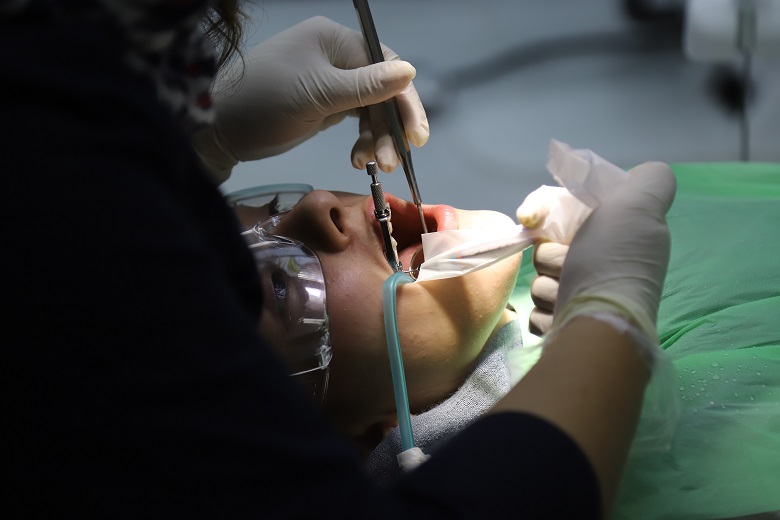
Kids first teeth are important too!
August 31, 2021
A Healthy Smile for Everyone: A Comprehensive Guide to Maintaining Oral and Dental Health
I can definitely do that for you. Here is the English version of the consolidated article, without titles or bullet points, and with numbers and punctuation removed as per your previous request. Your smile more than a sign of beauty is a mirror of your overall body health Oral and dental health profoundly impacts quality of life self confidence and even the prevention of serious diseases like heart disease diabetes and respiratory problems This article helps you understand the key principles of oral and dental hygiene and achieve a healthy radiant smile Your mouth is the gateway to your body Oral bacteria can cause serious problems like tooth decay gum disease which starts with bleeding and swelling and can lead to tooth loss and bad breath These problems can damage your digestive system heart and even lungs To maintain a healthy smile the following are essential Brush correctly and regularly at least twice a day with a soft toothbrush and fluoride containing toothpaste clean all tooth surfaces for two minutes Use dental floss at least once a day to remove food particles and plaque between teeth and below the gumline Maintain a healthy diet limit sugar and starch intake Include plenty of fruits vegetables dairy products rich in calcium and water in your diet Visit the dentist regularly every 6 months for an examination and professional cleaning so problems can be identified and treated in their early stages For children clean infants gums from an early age and teach children proper brushing techniques Fluoride treatment and fissure sealants can be beneficial for protecting their teeth Adults should pay attention to signs of gum disease and consider the impact of chronic diseases like diabetes and medications on their oral health Seniors should also be aware of dry mouth and if using dental prosthetics prioritize their regular care What you eat shapes your smile Sugars and starches are food for mouth bacteria which produce acid that damages tooth enamel and causes cavities In contrast calcium in dairy phosphorus in meat and fish vitamin D from sunlight and fatty fish and vitamin C in citrus are essential for tooth strength and gum health Water also helps neutralize acids by rinsing the mouth and stimulating saliva To have resilient teeth minimize sugar consumption and rinse your mouth after consuming them Replace sugary snacks with healthy options like fruits and vegetables Your mouth is an inseparable part of your overall body health Oral problems can affect general health Gum diseases are directly linked to cardiovascular diseases like heart attack and stroke and diabetes Inflammation from gum infections can enter the bloodstream and harm other parts of the body Pregnant women are at higher risk of premature birth if they do not maintain good oral hygiene Oral bacteria can enter the lungs increasing the risk of respiratory infections like pneumonia Additionally dental problems affect proper chewing and consequently digestion and nutrition Considering these connections it is important to take your oral health seriously and by regularly visiting the dentist not only care for your smile but also contribute to your overall body health Your oral health is an investment in a healthier more fulfilling life With simple yet regular care you can enjoy a beautiful healthy smile for many years.

Beyond the Mouth: Oral Health and Its Impact on Your Entire Body

Your oral health isn't just about a beautiful smile; it's a mirror and a gateway to your overall body health. The connection between what happens in your mouth and the rest of your body is much deeper than you might think, and oral problems can lead to serious systemic diseases. Why is Oral Health Important? Your mouth is full of bacteria. When oral hygiene is poor, these harmful bacteria multiply, causing gum disease and tooth decay. Inflamed gums can provide a pathway for these bacteria and inflammatory substances to enter your bloodstream. Once in the blood, these substances can travel to other organs and create problems. Connection to General Body Diseases: Heart Disease and Stroke: People with severe gum disease are at higher risk of cardiovascular diseases. Oral bacteria can contribute to plaque buildup in arteries. Diabetes: Uncontrolled diabetes increases the risk of gum disease, and conversely, gum infections can make blood sugar control more difficult. Respiratory Infections: Oral bacteria can be inhaled into the lungs, causing pneumonia or bronchitis, especially in the elderly or those with weakened immune systems. Pregnancy Complications: Gum disease in pregnant women is linked to a higher risk of preterm birth and low birth weight in babies. Digestive Issues: Improper chewing due to dental problems can lead to indigestion and digestive issues. Osteoporosis: This disease can also affect the jawbone, leading to tooth loss. Prevention and the Importance of Your Dentist: Maintaining good oral hygiene with regular brushing, daily flossing, and limiting sugars is key to prevention. Regular dental check-ups and professional cleanings are also essential. Your dentist isn't just looking for cavities; they can also detect early signs of systemic diseases in your mouth. By prioritizing your oral health, you're not just taking care of your teeth and gums; you're investing in your overall health and longevity
At Mehr Dental Clinic, we care about more than just treating teeth — we focus on your overall health. With expert care and personalized nutrition advice, we’re here to help you achieve a healthier, more beautiful smile

Smart nutrition, lasting smiles
Wisdom Teeth: Understanding, Management, and When to Extract Them
Wisdom teeth, or third molars, are the last teeth to emerge, typically appearing in the late teens or early twenties (ages 17-25). While once functional, changes in diet and jaw size mean there's often not enough space for them to erupt properly. This lack of space frequently leads to problems, often necessitating management or extraction. Why Wisdom Teeth Cause Problems The main issue is insufficient space in the jaw. This can lead to: Impacted Wisdom Teeth: The most common problem. The tooth may not fully emerge, getting stuck in the jawbone or under the gum. This impaction can occur at various angles, causing pain, swelling, infection, or damage to adjacent teeth. Partial Eruption and Hygiene Issues: If only part of the tooth emerges, a "gum flap" can form over it, trapping food and bacteria. This area is hard to clean, leading to recurring infections (pericoronitis) with severe pain, swelling, and bad breath. Damage to Neighboring Teeth: An impacted wisdom tooth can pressure the roots of adjacent teeth, causing damage, decay, or root resorption. It can also cause other teeth to shift, disrupting orthodontic alignment. Cysts and Tumors: Rarely, fluid-filled sacs (cysts) or benign tumors can form around an impacted wisdom tooth, severely damaging the jawbone and surrounding teeth. When Extraction is Necessary The decision to extract depends on the tooth's condition and the patient's symptoms. Extraction is usually recommended if there is: Chronic pain or discomfort Recurrent infections (pericoronitis) Irreparable decay due to poor positioning Damage to adjacent teeth (e.g., decay, root resorption) Orthodontic concerns (to prevent teeth shifting) Formation of cysts or tumors Preventative reasons: Even without symptoms, extraction might be recommended to prevent future problems, especially if there's a high risk of impaction or partial eruption. Extraction Process and Aftercare Wisdom tooth extraction can range from a simple procedure to complex surgery, depending on impaction. Before Surgery: The dentist or oral surgeon assesses the tooth with X-rays. Local anesthesia is common, but sedation or general anesthesia might be used for complex cases or anxious patients. During Surgery: The surgeon may cut the gum, remove some bone, and sometimes divide the tooth for easier removal. The site is then stitched closed. Aftercare: Control bleeding: Apply firm pressure with gauze for at least 30 minutes. Manage pain and swelling: Take prescribed pain medication. Use cold compresses for the first 24-48 hours. Avoid sucking/spitting: This can dislodge the blood clot, leading to painful dry socket. Soft diet: Stick to soft foods and liquids for a few days. Oral hygiene: Avoid brushing the surgical site directly, but keep the rest of your mouth clean. Rinse gently with warm salt water after 24 hours. Rest: Adequate rest aids healing. Is Extraction Always Necessary? No. If a wisdom tooth erupts fully, is correctly aligned, and can be easily cleaned, extraction is not needed. It can function like any other tooth. However, even these well-erupted wisdom teeth require diligent hygiene due to their location at the back of the mouth. The decision for wisdom tooth management should always be made in consultation with a dentist or oral and maxillofacial surgeon. They can assess your individual situation and recommend the best course of action. Ignoring wisdom tooth problems can lead to significant pain, serious infections, and long-term damage to your oral health.


